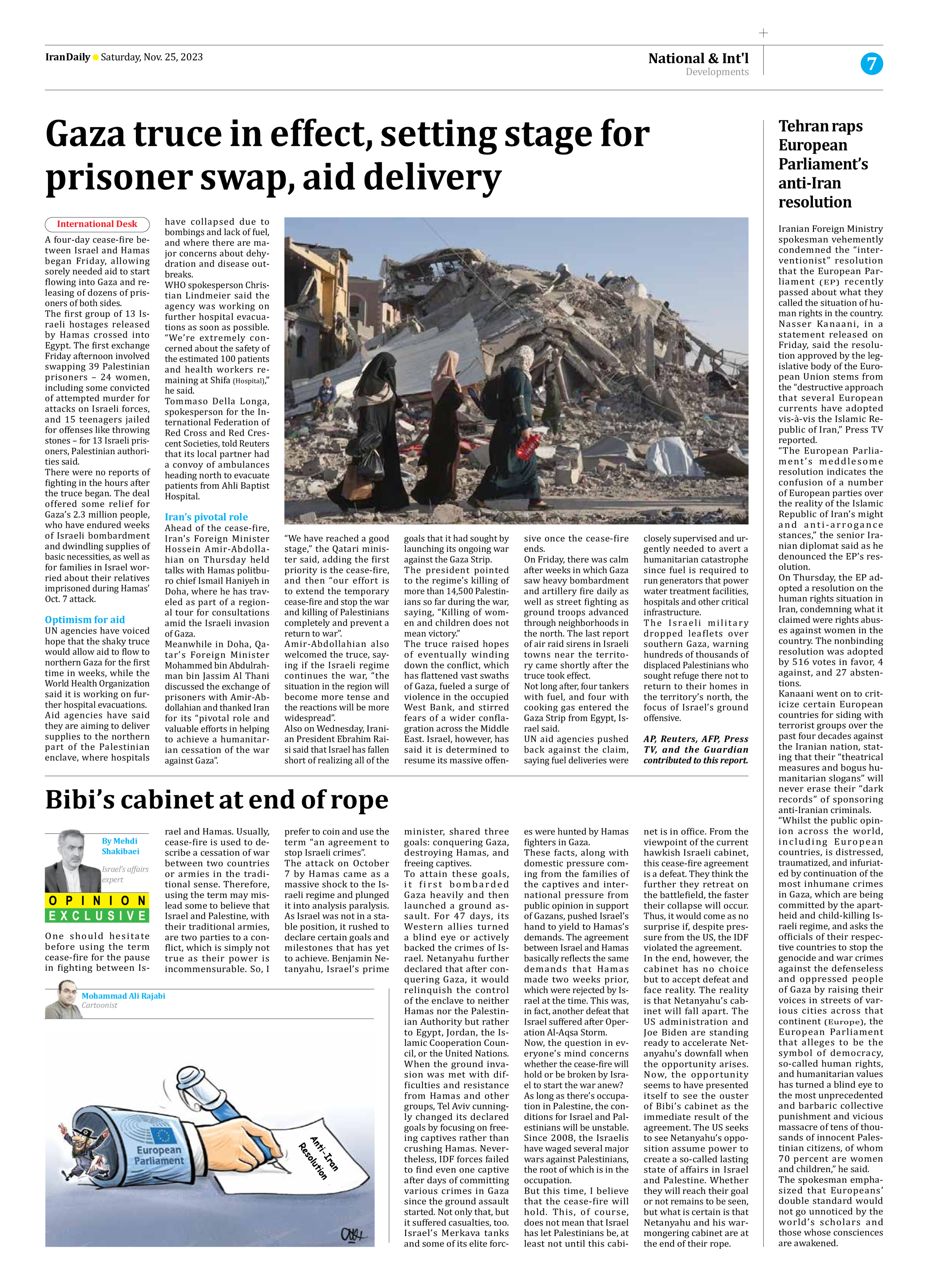
Gaza truce in effect, setting stage for prisoner swap, aid delivery
A four-day cease-fire between Israel and Hamas began Friday, allowing sorely needed aid to start flowing into Gaza and releasing of dozens of prisoners of both sides.
The first group of 13 Israeli hostages released by Hamas crossed into Egypt. The first exchange Friday afternoon involved swapping 39 Palestinian prisoners – 24 women, including some convicted of attempted murder for attacks on Israeli forces, and 15 teenagers jailed for offenses like throwing stones – for 13 Israeli prisoners, Palestinian authorities said.
There were no reports of fighting in the hours after the truce began. The deal offered some relief for Gaza’s 2.3 million people, who have endured weeks of Israeli bombardment and dwindling supplies of basic necessities, as well as for families in Israel worried about their relatives imprisoned during Hamas’ Oct. 7 attack.
Optimism for aid
UN agencies have voiced hope that the shaky truce would allow aid to flow to northern Gaza for the first time in weeks, while the World Health Organization said it is working on further hospital evacuations.
Aid agencies have said they are aiming to deliver supplies to the northern part of the Palestinian enclave, where hospitals have collapsed due to bombings and lack of fuel, and where there are major concerns about dehydration and disease outbreaks.
WHO spokesperson Christian Lindmeier said the agency was working on further hospital evacuations as soon as possible. “We’re extremely concerned about the safety of the estimated 100 patients and health workers remaining at Shifa (Hospital),” he said.
Tommaso Della Longa, spokesperson for the International Federation of Red Cross and Red Crescent Societies, told Reuters that its local partner had a convoy of ambulances heading north to evacuate patients from Ahli Baptist Hospital.
Iran’s pivotal role
Ahead of the cease-fire, Iran’s Foreign Minister Hossein Amir-Abdollahian on Thursday held talks with Hamas politburo chief Ismail Haniyeh in Doha, where he has traveled as part of a regional tour for consultations amid the Israeli invasion of Gaza.
Meanwhile in Doha, Qatar’s Foreign Minister Mohammed bin Abdulrahman bin Jassim Al Thani discussed the exchange of prisoners with Amir-Abdollahian and thanked Iran for its “pivotal role and valuable efforts in helping to achieve a humanitarian cessation of the war against Gaza”.
“We have reached a good stage,” the Qatari minister said, adding the first priority is the cease-fire, and then “our effort is to extend the temporary cease-fire and stop the war and killing of Palestinians completely and prevent a return to war”.
Amir-Abdollahian also welcomed the truce, saying if the Israeli regime continues the war, “the situation in the region will become more tense and the reactions will be more widespread”.
Also on Wednesday, Iranian President Ebrahim Raisi said that Israel has fallen short of realizing all of the goals that it had sought by launching its ongoing war against the Gaza Strip.
The president pointed to the regime’s killing of more than 14,500 Palestinians so far during the war, saying, “Killing of women and children does not mean victory.”
The truce raised hopes of eventually winding down the conflict, which has flattened vast swaths of Gaza, fueled a surge of violence in the occupied West Bank, and stirred fears of a wider conflagration across the Middle East. Israel, however, has said it is determined to resume its massive offensive once the cease-fire
ends.
On Friday, there was calm after weeks in which Gaza saw heavy bombardment and artillery fire daily as well as street fighting as ground troops advanced through neighborhoods in the north. The last report of air raid sirens in Israeli towns near the territory came shortly after the truce took effect.
Not long after, four tankers with fuel, and four with cooking gas entered the Gaza Strip from Egypt, Israel said.
UN aid agencies pushed back against the claim, saying fuel deliveries were closely supervised and urgently needed to avert a humanitarian catastrophe since fuel is required to run generators that power water treatment facilities, hospitals and other critical infrastructure.
The Israeli military dropped leaflets over southern Gaza, warning hundreds of thousands of displaced Palestinians who sought refuge there not to return to their homes in the territory’s north, the focus of Israel’s ground offensive.
AP, Reuters, AFP, Press TV, and the Guardian contributed to this report.







